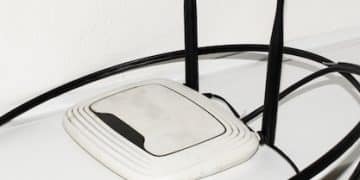Set Up a VPN on Your Router for Top Privacy in 2025

Setting up a VPN on your router in 2025 enhances online privacy by encrypting all internet traffic within your network, safeguarding your data from potential threats and ensuring secure browsing for all connected devices.
Ready to supercharge your online privacy? Setting up a VPN on your router for enhanced online privacy in 2025 is the ultimate move. It’s like having a personal bodyguard for all your internet-connected devices. Let’s get started!
Why You Need a Router VPN in 2025
In 2025, online privacy is more critical than ever. With increasing cyber threats and data breaches, securing your entire network becomes a necessity. A router VPN provides comprehensive protection for all devices connected to your home network, ensuring that your data remains private and secure.
Enhanced Security for All Devices
Setting up a VPN on your router protects every device connected to it, including smart TVs, gaming consoles, and IoT devices that may not support VPN software directly. This ensures a unified layer of security across your entire network.
Bypassing Geo-Restrictions
A router VPN also allows you to bypass geo-restrictions, providing access to content that might be blocked in your region. This is particularly useful for streaming services and accessing international content.

Let’s dive into the benefits of using a VPN on your router.
- Full Network Protection: Secures all connected devices simultaneously.
- Bypass Restrictions: Access geo-restricted content easily.
- Always-On Security: Ensures continuous protection without manual intervention.
By implementing a VPN on your router, you create a secure environment for all your online activities.
Choosing the Right VPN Provider
Selecting the right VPN provider is crucial for a successful router VPN setup. Not all VPNs are created equal, and compatibility with routers, server locations, and security features vary significantly. Consider a provider that offers robust encryption, a no-logs policy, and a wide range of server locations.
Key Considerations
When choosing a VPN provider, prioritize those that offer specific router setup guides and compatibility. This ensures a smoother installation process and optimal performance.
Top VPN Providers for Routers
Explore VPN providers known for their router compatibility and strong security features. Reading reviews and comparing features can help you make an informed decision.
Here are some popular VPN providers that work well with routers:
- ExpressVPN: Known for its speed and ease of use.
- NordVPN: Offers a wide range of server locations and robust security features.
- Surfshark: A budget-friendly option with unlimited device connections.
Choosing the right VPN provider is essential for maximizing the benefits of a router VPN setup.
Router Compatibility and Firmware
Before setting up a VPN on your router, ensure that your router is compatible with VPN configurations. Some routers come with built-in VPN client support, while others may require firmware updates or custom firmware installation.
Checking Router Compatibility
Consult your router’s manual or the manufacturer’s website to determine if it supports VPN client functionality. Look for terms like “VPN passthrough” or “VPN client” in the specifications.
Updating Router Firmware
Keeping your router’s firmware up to date is crucial for security and performance. Check your router’s admin panel for firmware updates and install them according to the manufacturer’s instructions.

Let’s discuss the importance of firmware.
- Security Updates: Firmware updates often include security patches that protect your router from vulnerabilities.
- VPN Support: Some firmware updates add or improve VPN client support.
- Performance Enhancements: Updated firmware can improve your router’s overall performance.
Ensuring your router is compatible and up to date is a critical step in setting up a VPN.
Step-by-Step Guide to Setting Up a VPN on Your Router
Setting up a VPN on your router involves several steps, from accessing the router’s admin panel to configuring the VPN client settings. Follow this step-by-step guide to ensure a smooth installation process.
Accessing Your Router’s Admin Panel
Open a web browser and enter your router’s IP address (usually 192.168.1.1 or 192.168.0.1) in the address bar. Enter your username and password to log in to the admin panel.
Configuring VPN Client Settings
Navigate to the VPN client settings in your router’s admin panel. Enter the VPN server address, username, and password provided by your VPN provider. Choose the appropriate VPN protocol (such as OpenVPN) and configure any additional settings as needed.
Here’s the step by step guide:
- Log in: Access your router’s admin panel.
- Enter Credentials: Fill in the required VPN details.
- Save: Save the settings.
By following these steps, you can successfully set up a VPN on your router and protect your entire network.
Troubleshooting Common Issues
Setting up a VPN on your router can sometimes present challenges. Addressing common issues promptly ensures uninterrupted protection and performance. Understanding potential problems and their solutions is essential for a smooth experience.
Connection Problems
If you experience connection problems after setting up the VPN, double-check your VPN credentials and server settings. Ensure that your internet connection is stable and that your router’s firmware is up to date.
Speed Issues
VPNs can sometimes reduce internet speed due to encryption overhead. To improve speed, try connecting to a different VPN server location or changing the VPN protocol. Experimenting with different settings can help you find the optimal balance between speed and security.
Here’s a list of common issues and their solutions:
- Connection Drops: Verify VPN credentials and server settings.
- Slow Speeds: Try a different server or protocol.
- Compatibility Issues: Ensure your router supports the VPN protocol.
By addressing these common issues, you can ensure a stable and fast VPN connection on your router.
Advanced Configurations and Security Tips
For advanced users, there are several configurations that can further enhance the security and performance of your router VPN setup. These include configuring DNS settings, enabling a kill switch, and setting up port forwarding.
Configuring DNS Settings
Using a private DNS server can prevent DNS leaks and further protect your online privacy. Configure your router to use a trusted DNS server, such as Cloudflare or Google Public DNS.
Enabling a Kill Switch
A kill switch automatically disconnects your internet connection if the VPN connection drops, preventing unencrypted data from being transmitted. Enable the kill switch feature in your VPN client settings to ensure continuous protection.
Let’s list advanced configurations and security tips:
- Private DNS: Use a trusted DNS server.
- Kill Switch: Enable to prevent data leaks.
- Port Forwarding: Configure for specific applications.
Exploring these advanced configurations can provide an additional layer of security and improve your overall VPN experience.
| Key Point | Brief Description |
|---|---|
| 🛡️ Network Security | Protects all connected devices from online threats. |
| 🌍 Geo-Unblocking | Access content restricted by geographical location. |
| ✅ VPN Compatibility | Ensure your router supports VPN client functionality. |
| 🔧 Troubleshooting | Address common issues like connection and speed problems. |
Frequently Asked Questions
▼
A router VPN is a VPN set up on your router, encrypting all internet traffic for every device connected to the network. It’s essential for protecting all devices, including those that can’t run VPN software.
▼
Check your router’s manual or the manufacturer’s website for VPN client support. Terms like “VPN passthrough” or “VPN client” indicate compatibility. You might also need to update your firmware.
▼
Yes, VPNs can sometimes reduce internet speed due to encryption. To minimize this, choose a faster VPN protocol like WireGuard and connect to a server closer to your location.
▼
A kill switch automatically disconnects your internet connection if the VPN drops, preventing unencrypted data transmission. It ensures your privacy is always protected, even if the VPN fails.
▼
While possible, free VPNs often have limitations like slower speeds, limited server locations, and data caps. They may also lack robust security features, so it’s generally better to use a reputable paid VPN service.
Conclusion
Setting up a VPN on your router for enhanced online privacy in 2025 is a forward-thinking strategy for protecting your digital life. By choosing the right VPN provider, ensuring router compatibility, and following our step-by-step guide, you can fortify your network’s defenses and enjoy a safer online experience for all your devices.





